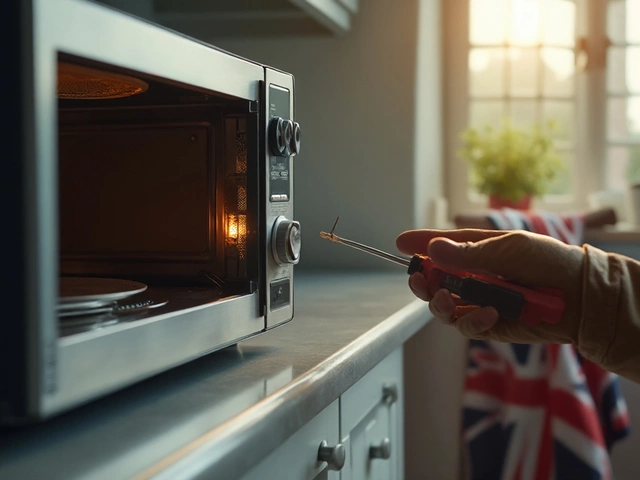Ever wonder what makes your washing machine spin or your fridge stay cold? Knowing the basics helps you spot problems early and saves you money. Below we break down the core ideas behind the most common home appliances and give you quick tricks to keep them humming.
Washing machines use an electric motor to turn a drum. Water fills the drum through a valve, mixes with detergent, and the drum’s motion agitates the clothes. A pump then drains the water, and a heating element warms it if you select a hot cycle. If the drum stops or the water won’t heat, the motor, valve, or heating element is usually the culprit.
Refrigerators stay cool thanks to a compressor, a coolant (often called refrigerant), and an evaporator coil. The compressor squeezes the refrigerant, raising its temperature, then it releases heat through a coil at the back of the fridge. As the refrigerant cools down, it absorbs heat from inside the fridge, keeping food fresh. A noisy compressor or frost on the coil often means a blockage or low refrigerant.
Electric ovens have heating elements at the top and bottom. When you set a temperature, a thermostat tells the elements to turn on until the interior reaches the set point. If the oven won’t heat, the element may be burnt out or the thermostat may be faulty. A digital display can also fail, but the heating part is usually the element.
Heat pumps work like reversible air conditioners. They pull heat from the outside air (or ground) and pump it inside during winter, then reverse in summer to cool the house. The key parts are the compressor, a refrigerant loop, and a fan. If the fan stops or the refrigerant leaks, the system will feel weak or stop working altogether.
Dishwashers spray hot water from a pump through rotating arms. Sensors detect how dirty the dishes are and adjust the cycle length. A clogged spray arm or a faulty pump can leave dishes dirty, while a broken heating element may mean the water never gets hot enough.
1. Regular cleaning: Dust the coils on your fridge and the fan blades on your heat pump. A quick vacuum every few months keeps airflow strong and prevents overheating.
2. Check hoses and seals: Look for cracks in washing machine hoses or wear on fridge door gaskets. Replacing a small hose or a rubber seal is cheaper than fixing flood damage later.
3. Level everything: A wobbly fridge or dishwasher can cause uneven cooling and extra wear on motors. Use a spirit level and adjust the feet until the unit sits flat.
4. Don’t overload: Stuffing a washing machine or dishwasher beyond its capacity strains motors and reduces cleaning performance. Follow the manufacturer’s load limits for best results.
5. Run maintenance cycles: Many ovens, dishwashers, and washing machines have a self‑clean or descaling program. Running these once a month clears buildup that can cause faults.
Knowing how each appliance does its job gives you confidence when something goes wrong. If you’ve tried the basics and the problem persists, it’s time to call a professional – but you’ll have saved yourself a lot of guesswork and possibly a costly repair.
Keep this guide handy; it’s a quick reference that turns mystery into simple, actionable steps. Your home will run smoother, and your wallet will thank you.

Curious about how your home appliances actually work? Get a full breakdown of what happens inside, troubleshooting tips, and smart ways to keep everything running smoothly.

Struggling with a troublesome boiler? Discover the most frequent issues like lack of heat, strange noises, and leaking water. Learn practical tips and tricks on how to diagnose and fix these problems on your own. Recognize when it's time to call a professional and keep your home warm and comfortable.

This article breaks down what an appliance standard really is and why it matters when you’re buying or servicing home appliances. You’ll learn about the rules that keep appliances safe and efficient, plus tips for spotting compliant models. It explains how standards affect your bills and the planet. Real-world examples make it clear and easy to understand. Use this guide to make smarter choices about your appliances.

When it comes to kitchen convenience, dishwashers are hard to beat. They free up our time, reduce water and energy use, and help keep our kitchenware sparkling clean. But how long should one really expect a dishwasher to last? This article will explore average lifespans, key factors affecting longevity, and practical tips for extending the life of your trusty machine, ensuring you get the most value and efficiency.

Thinking about swapping out your gas hob? Safety rules in the UK are strict, and there’s more to it than just unscrewing pipes. This article looks at whether you really need a gas engineer for the job, what could go wrong if you cut corners, how to pick the right pro, and little-known facts about what happens during an installation. It’s a no-nonsense breakdown for anyone facing a hob swap, putting your safety at the front of the queue.

Learn fast how to spot a blown microwave fuse, test it safely, and replace it yourself. Step‑by‑step instructions, tools needed, and common pitfalls covered.